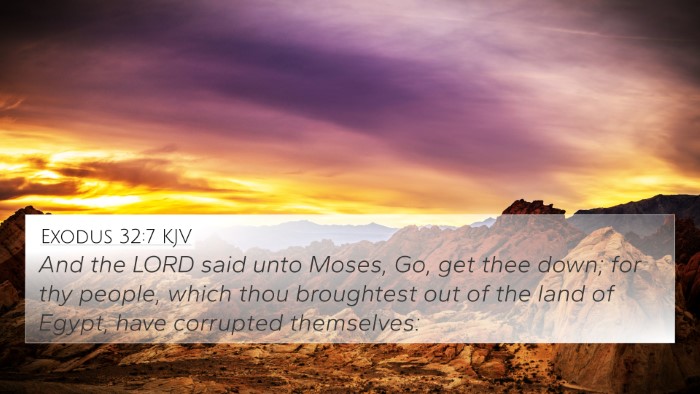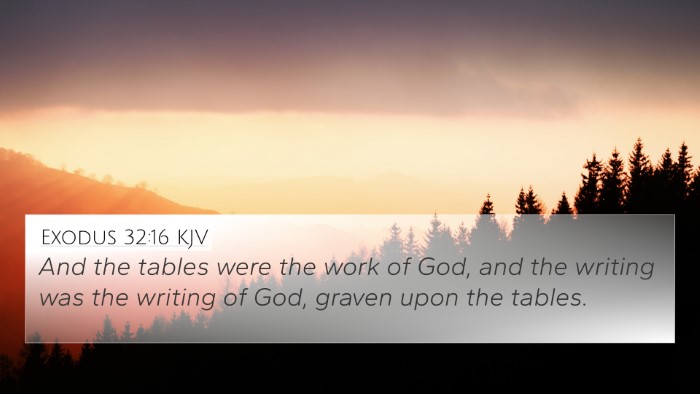Understanding Deuteronomy 9:8
Verse: "Also in Horeb ye provoked the LORD to wrath, so that the LORD was angry with you to have destroyed you." (Deuteronomy 9:8)
Overview of the Verse
This passage highlights the rebellion of the Israelites at Horeb, where they provoked God's anger by their disobedience and idolatry. It serves as a reminder of the seriousness of sin and God's righteous judgment.
Commentary Insights
Matthew Henry's Commentary: Matthew Henry emphasizes that the sin of the Israelites was not a momentary lapse but a sustained rebellion against God’s commandments. He notes that their actions were especially grievous considering the context; they had just received the law and witnessed God's mighty works.
Albert Barnes' Commentary: Barnes reflects on the historical significance of Horeb, also known as Sinai, where the Israelites entered into a covenant with God. He examines how their provocative actions led to divine anger and what this signifies about God's holiness and justice.
Adam Clarke's Commentary: Clarke discusses the implications of this verse for understanding God’s relationship with His people. He notes that the severity of God's anger is a direct response to the severity of their transgressions, and it serves as a warning for future generations.
Thematic Connections
This verse provides rich thematic connections within scripture. It reflects the broader themes of rebellion, judgment, and mercy seen throughout both the Old and New Testaments.
Cross-References
- Exodus 32:1-8 - This passage details the golden calf incident, a specific event tied to the provocation mentioned in Deuteronomy 9:8.
- Psalm 78:17-20 - A psalm that recounts the rebellion of Israel and the resulting anger of God.
- Romans 2:5 - Discusses the judgment of God and how it is a response to unrepentant hearts, paralleling the reaction to Israel’s sin.
- Hebrews 3:16-19 - Reflects on the disbelief of the Israelites and the consequences they faced, echoing similar themes of rebellion.
- 1 Corinthians 10:5-6 - Highlights how the actions of the Israelites serve as examples of the consequences of disobedience.
- Isaiah 63:10 - Discusses the grief of the Spirit when the people rebel, resulting in God’s anger.
- Deuteronomy 4:25-27 - Prophecies about the consequences of turning away from God, reinforcing the message of Deuteronomy 9.
- Nahum 1:3 - Details God’s judgment and wrath, reflecting the nature of God as portrayed in Deuteronomy 9:8.
- 1 Peter 2:9-10 - Speaks of God’s people and the mercy given to them, contrasting the judgment depicted in Deuteronomy 9.
- Exodus 34:6-7 - Describes God’s character, balancing His mercy with justice, also related to the themes in Deuteronomy 9.
Tools for Bible Cross-Referencing
To further explore the connections and themes in the Bible, various tools can be employed:
- Bible Concordance: Helps in looking up specific words to find related verses.
- Bible Cross-Reference Guide: Directs readers to related scriptures based on shared themes or events.
- Cross-Reference Bible Study: Involves comparing multiple verses to gain a fuller understanding of biblical messages.
- Comprehensive Bible Cross-Reference Materials: Materials that compile extensive verses on specific subjects or themes.
Using Cross-References in Study
Understanding Deuteronomy 9:8 within the context of other scriptures enhances one’s comprehension of biblical teachings.
To effectively use cross-references:
- Identify key themes and words in the verse.
- Utilize tools like concordances and study guides to find related scriptures.
- Construct thematic studies that examine how various scriptures converse with and illuminate each other.
- Engage with scriptures both individually and within their larger narrative to appreciate their connections.
Conclusion
Deuteronomy 9:8 serves not only as a historical account of Israel's failings but also as a profound reminder of God's righteousness and mercy. By studying this verse in conjunction with others, believers can gain deeper insights into the character of God and the gravity of human sin.





